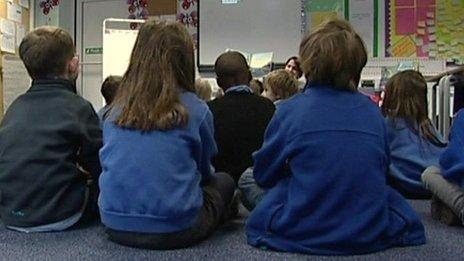'Local schools' drive inequality
- Published

Linking house prices with school places builds in inequality, says study
Deciding school admissions on distance between home and school is a major driver of educational inequality between rich and poor, say researchers.
Expecting pupils to go to their local school means poorer children are much less likely to attend high-achieving schools, says the study.
It shows that the choice of good schools expands with greater affluence.
The "size of your mortgage" should not be the way to allocate school places, say researchers.
The study examined how families made choices between state schools - and why children from deprived families were more likely to be concentrated in the worst performing schools.
Reducing choice
The researchers, from Bristol University's Centre for Market and Public Organisation, Cambridge University and the Institute for Fiscal Studies, found that differences were not the result of wealthier families having better-informed, more strategic school preferences.
Instead they found the substantial difference was that wealthier families were more likely to live in areas with more high-achieving schools.
Even though poorer families might want to send their child to a school with good results, their choice was limited by a system based on prioritising those living locally.
The research used information from the Millennium Cohort Study, which tracks the progress of young people born at the beginning of the new century.

Many schools use distance from home in the allocation of places
The research showed that the link between home address, house prices and the allocation of places allowed wealthy families to ring-fence more of the preferred options.
"Different families have different sets of schools to choose from. Richer families choose between schools that have on average much higher grades than poorer families," says the research.
Ellen Greaves, of the Institute for Fiscal Studies, said it was "disappointing" to see how parental choice was restricted by admissions rules based on distance, which meant children's education was "affected by the ability of their parents to move close to their preferred school".
This inequality worked on multiple levels.
Pupils in poorer areas were likely to have fewer high-performing schools in travelling distance.
And within local areas, when individual sought-after schools used distance as a tie-breaker, it meant that wealthier families could afford to buy houses to get nearer to the front of the queue.
"Poor parents have fewer high performing schools available to them. This will remain true as long as proximity, and hence the size of your mortgage, determines access to such schools," said Anna Vignoles, professor of education at Cambridge University.
But the use of proximity as a way of allocating places is very widespread - and the study noted that the idea of sending children to a local school is well established and popular with many parents, particularly at primary level.
Along with comparing academic results, the distance to school is an important factor when parents are making their school preferences.
The researchers also noted that using a lottery as an alternative has been widely discussed, but in practice is used infrequently.
Admissions system such as banding, designed to get a more varied mix of abilities or from a wider geographical area, are still based to some extent on where people live.
Prof Vignoles says that "more imaginative school allocation mechanisms are needed".
Simon Burgess, director of the Centre for Market and Public Organisation, and research leader, said: "Obviously the overall goal for policy is to make all schools excellent.
"But until that nirvana arrives we should not ignore the question of how places in the better performing schools are allocated. At the moment, the proximity criterion for admissions means that differences in family income have a substantial and regressive impact on that allocation."
- Published3 March 2014

- Published1 May 2014

- Published23 July 2014

- Published27 February 2014
